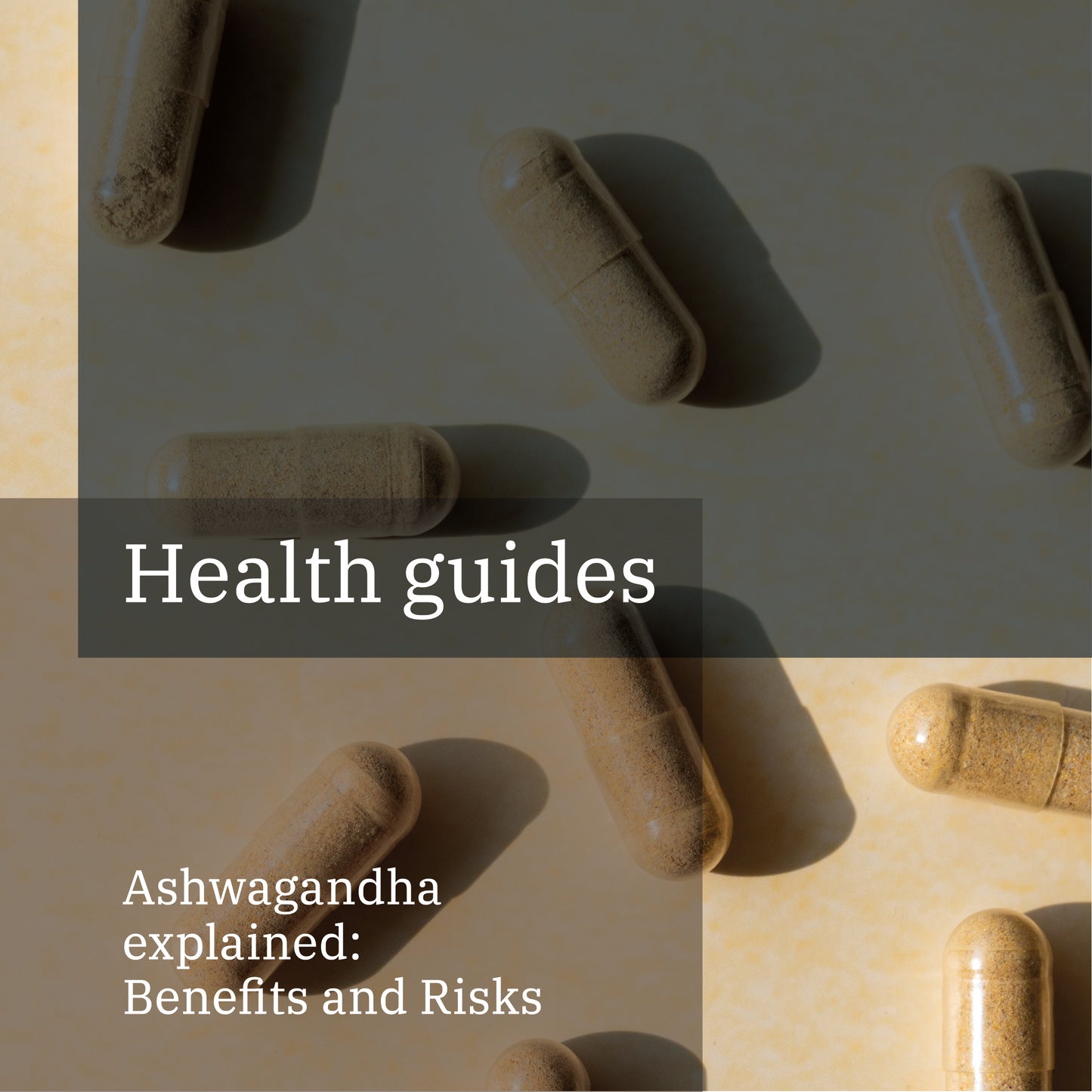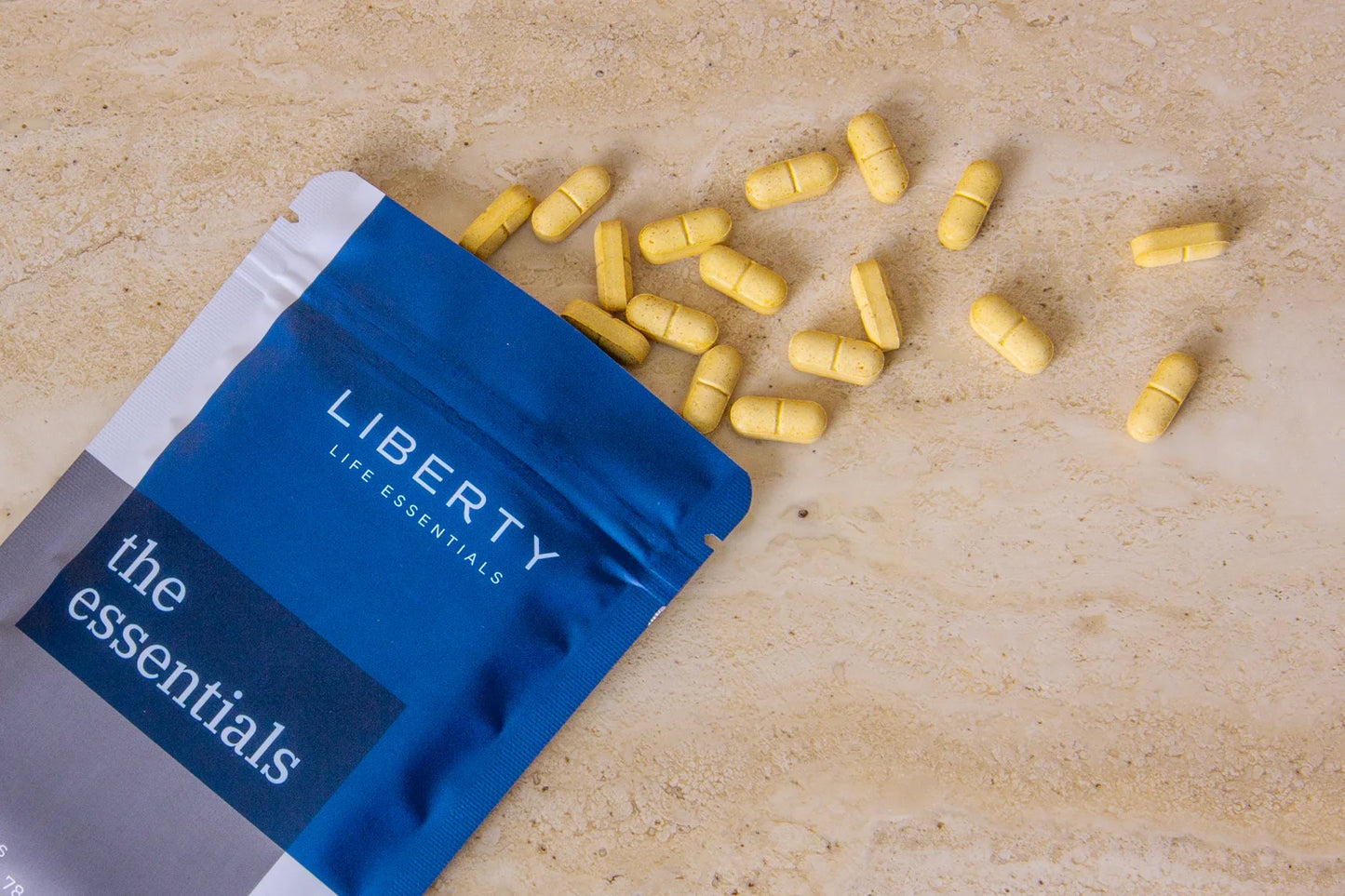
In het kort
- Het supplement Ashwagandha is het poeder van de wortel van een plant met dezelfde naam.
- Ashwagandha is een adaptogeen, een kruidensupplement dat als voornaamste functie heeft om fysieke en mentale stress te verminderen.
- Ashwagandha kan mogelijk:
1. Stress en angst verminderen;
2. De focus en het geheugen verbeteren;
3. Hormoonniveaus in balans brengen;
4. Seksuele gezondheid en vruchtbaarheid bevorderen;
5. Sportprestaties en spierherstel verbeteren.
- Ashwagandha maakt deel uit van de nachtschade plantenfamilie, waartoe ook o.a. tomaten, aubergines, aardappelen en meer behoren. De bladeren van deze planten kunnen maag- of leverklachten veroorzaken.
- Hoewel het actieve ingrediënt in ashawagandha-supplementen de wortel is, kunnen supplement van slechte kwaliteit ook de bladeren van de plant bevatten. Kies daarom nooit voor een niet-gepatenteerde/merkloze variant ashwagandha, omdat dit de zuiverheid van het product niet kan garanderen.
- De WHO beschouwt ashwagandha supplementen veilig onder een dagelijkse dosering van 500 mg;
- Overmatig gebruik (1000+ mg dagelijks gedurende langere perioden) wordt er van verdacht emotionele verdoving te veroorzaken, hoewel dit niet wetenschappelijk bewezen is.
- KSM-66 ashwagandha wordt beschouwd als de hoogste kwaliteit op de markt. Het maakt deel uit van onze producten Work Hard Play Hard (Professionals) (300 mg p/dag) en Peak Performance (Volwassenen) (250 mg p/dag).
Waarom is ashwagandha zo populair?
Het kruiden supplement ashwagandha (Withania somnifera) heeft de afgelopen jaren enorme populariteit verworven in West-Europa en Noord-Amerika, voornamelijk vanwege haar stressverlagende en focusverbeterende eigenschappen. Het bestaat uit het poeder van de wortel van een plant met dezelfde naam, te vinden in delen van India, Afrika en het Midden-Oosten, en met een geschiedenis van meer dan 3.000 jaar in de Ayurvedische geneeskunde.
Met de toenemende populariteit van ashwagandha neemt ook het aantal wetenschappelijke studies en minder wetenschappelijke publicaties op social media platforms zoals TikTok toe. Om feiten van fictie te scheiden, richt dit artikel zich op de (potentiële) voordelen en (potentiële) risico's van ashwagandha.
Potentiële voordelen van ashwagandha
Helpt stress en angst te verminderen
Een van de belangrijkste redenen voor de populariteit van ashwagandha, is vanwege haar stress en angst verlagende eigenschappen. Ashwagandha wordt beschouwd als een adaptogeen, een natuurlijke stof, meestal een kruid, wortel of paddenstoel, dat de geest en het lichaam helpt zich aan te passen aan stress door fysiologische functies in balans te brengen en te reguleren. Dit betekent dat ashwagandha het lichaam helpt bij het beheersen van de stress, ook wanneer de externe oorzaak van de stress nog aanwezig is.
Verschillende studies bevestigen deze claims. Een studie met 58 deelnemers gedurende een periode van 8 weken meldde aanzienlijk minder stress en lagere cortisolniveaus, terwijl een andere studie met 60 deelnemers gedurende 60 dagen een significante vermindering van angst rapporteerde.
Helpt de focus en het geheugen te verbeteren
Ashwagandha helpt de hersenfuncties te verbeteren, waaronder de focus en het geheugen. Dit is vooral nuttig voor mannen en vrouwen met een veeleisende carrière, gezin en sociaal leven.
Verschillende studies bij zowel gezonde mensen als dieren hebben duidelijke verbeteringen aangetoond in concentratie en geheugen, mentale rekenvaardigheid, sensorimotorische functies en mentale reactiesnelheid. Bovendien kon een onafhankelijke studie ashwagandha koppelen aan verhoogde cognitie bij patiënten met vroege dementie of bipolaire stoornis.
Draagt bij aan een stabiel testosteronniveau
Testosteron speelt een cruciale rol in de groei, voortplanting en het algeheel welzijn van mannen. Dit mannelijke hormoon speelt een essentiële rol in de productie van rode bloedcellen en sperma, spier- en botmassa, vetverdeling en kracht. Echter beginnen de testosteronniveaus te dalen of te schommelen rond de 40.
Het dagelijks slikken van ashwagandha wordt verondersteld de testosteronniveaus in balans te brengen, met een indirect effect op spiermassa, botdichtheid, regulatie van de stemming, energieomzetting en een gezond seksueel verlangen.
In een studie met gezonde maar te zware mannen in de leeftijd van 40 tot 70 jaar, werd ashwagandha-suppletie gedurende 8 weken geassocieerd met 15% hogere testosteron niveaus en 18% hogere niveaus van DHEA-S (welke een belangrijke rol speelt in de productie van testosteron).
Bevordert sexuele gezondheid en vruchtbaarheid
Naast het effect op testosteronstabiliteit hebben studies ashwagandha ook gekoppeld aan een hoger aantal zaadcellen en zaadconcentratie. Het vermogen van ashwagandha om de bloedcirculatie te verbeteren en het potentie als remedie tegen onvruchtbaarheid lijkt veelbelovend.
Eén studie meldde dat "verminderde vruchtbaarheid bij mannen werd verbeterd door ashwagandha-wortelextract, wat bleek uit een toename van de zaadconcentratie, ejaculatievolume en beweeglijke zaadcellen". Meerdere onafhankelijke onderzoeken zijn momenteel gaande om deze bevindingen te bevestigen.
Bevordert sportprestaties en herstel
Ashwagandha krijgt veel social media aandacht vanwege de positieve effecten op de fysieke gezondheid, vooral omdat het wordt verondersteld de sportprestaties te verbeteren en spierherstel te versnellen wat het tot een populair supplement onder fitnessliefhebbers maakt.
Een uitgebreid onderzoek naar de impact van ashwagandha op fysieke prestaties heeft aangetoond dat het succesvol is in het "verbeteren van variabelen die verband houden met kracht/vermogen, cardiorrespiratoire conditie en vermoeidheid/herstel bij gezonde mannen en vrouwen." De waarschijnlijkheid van verbetering in fysieke en sportieve prestaties werd bevonden op meer dan 95%.
Potentiële risicos van ashwagandha
Potentiële bijwerkingen van ashwangandha
Sommige gebruikers melden maag- of leverklachten als een bijwerking van het gebruik van ashwagandha-supplementen. Dit wordt vermoedelijk toegeschreven aan de kwaliteit van het product.
Ashagandha is deel van de nachtschade plantenfamilie (waar ook o.a. tomaten, aardappels en aubergine deel van uitmaken). Net als andere nachtschade planten, kunnen de ashwagandha bladeren mogelijk maag- en/of leverklachten veroorzaken, terwijl alle bekende voordelen van ashwagandha uit de wortel komen. Als de plant niet op de juiste manier wordt verwerkt, kunnen delen van het blad in het supplement terechtkomen en een maag en/of lever problemen veroorzaken.
Hoewel wetenschappelijk onderzoek naar de schadelijkheid van ashwagandha beperkt is en individuele gevoeligheid en geschikte dosering per persoon kan verschillen, zijn er weinig formele klachten bekend en kan ashwagandha over het algemeen als veilig worden beschouwd, mits een kwalitatief product wordt geconsumeerd in hoeveelheden onder de 500 mg per dag (WHO).
Mocht u echter maag-, en/of leverklachten ervaren tijdens het gebruik van ashwagandha raden wij aan het gebruik van ashwagandha per direct te stoppen en contact op te nemen met uw huisarts. Ook wordt het gebruik van aswagandha sterk afgeraden tijdens zwangerschap of borstvoeding.
Wordt er van verdacht emotionele verdoving te veroorzaken bij overmatig gebruik
Sommige ashwagandha gebruikers beschrijven een gevoel van emotionele verdoving na langdurig gebruik. Dit wordt voornamelijk gemeld door fitnessliefhebbers op TikTok, alhoewel we tijdens het onderzoek voor dit artikel geen wetenschappelijke studies hebben gevonden welke dit bevestigen. Er wordt gedacht dat deze ervaringen mogelijk worden veroorzaakt door gebrek aan kennis over ashwagandha's stress verlagende aspecten, in combinatie met overmatig gebruik in de zoektocht naar versnelde spiergroei. Om optimale en veilige werking te garanderen, raden wij daarom altijd aan om de aanbevolen dosering niet te overschrijden en een hoogwaardig ashwagandha-product te kiezen.
Kwaliteitsverschillen
Bij het selecteren van een ashwagandha-supplement is het belangrijk om de verschillen in kwaliteit tussen verschillende producenten en merken te begrijpen. Kwaliteitsverschillen zijn voornamelijk gekoppeld aan de teelt, verwerking en formulering van het supplement. Producenten van mindere kwaliteit kunnen minder grondige oogst- en verwerkingstechnieken hanteren, waardoor hun eindproducten mogelijk de bladeren en andere delen van de ashwagandha plant bevatten. Met als gevolg een grotere kans op maag en/of lever problemen.
Conclusie
Ashwagandha blijft verbazen doordat nieuwe studies nog steeds nieuwe voordelen van dit veelzijdige supplement blijven ontdekken. Van zijn verlichting bij stress en angst, verbeterde focus en geheugen, verbeterde seksuele gezondheid en vruchtbaarheid, tot positieve effecten op fysieke prestaties, het aanvullen van je dieet met ashwagandha kan vele mentale en fysieke voordelen opleveren, zolang het op een gecontroleerde manier wordt geproduceerd en geconsumeerd.
Daar tegenover staat een gebrek aan wetenschappelijk onderzoek rond mogelijke risico's en bijwerkingen van ashwagandha suppletie. Om het risico van mogelijke negatieve bijwerkingen te minimaliseren, is het aanbevolen om de aanbevolen dagelijkse hoeveelheid van 500mg niet te overschrijden. Kies daarnaast altijd ashwagandha van een gepattenteerde bron. Dit geeft meer garantie op een hogere kwaliteit. KSM-66 staat bekend om het gebruik van alleen de hoogste kwaliteit wortels en hun uitgebreide klinische studies.
Dat gezegd hebbende, geldt voor ashwagandha hetzelfde als voor elk supplement, namelijk dat je bij negatieve bijwerking beter gelijk kan stoppen met het supplement en een arts moet raadplegen bij negalieve bijwerkingen.
KSM-66 ashwagandha is onderdeel van onze Work Hard Play Hard (Professionals) en Peak Performance (Volwassenen) producten, beide onderdeel van onze Life Phase Collection.
Bronnen:











